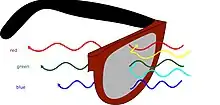EnChroma
EnChroma lenses are specialized glasses designed to address symptoms of red-green color blindness. Studies have shown that these lenses can alter the perception of colors that were already perceived, but they do not fully restore normal color vision. Some initial claims made by the manufacturer have been subject to criticism and described as marketing hype,while research suggests that the lenses may have a limited positive impact on individuals with red-green color blindness.[1] [2][3] [4][5] [6][7]
 | |
 Glasses with special lenses which change color perception. | |
| Manufacturer | EnChroma |
|---|---|
| Website | https://enchroma.com/ |
History
Glass scientist Donald McPherson invented EnChroma glasses by accident. He originally was trying to develop lenses to protect and aid surgeons during laser operations.[8]
Technology

The lenses focus on the most common color vision deficiency which is caused by the red and green retinal cone cells that, when responding to light, coincide. To eliminate the overlapping of the wavelengths of light, there is an optical material called a notch filter, which is capable of removing the exact wavelengths of light in the location where it overlaps, getting a simplified differentiation of colors. The glasses block specific wavelengths to create a clearer separation of different color signals so that they can be better calculated by the brain. The separation of signals allows most people with color blindness to distinguish colors, but the glasses will have little to no effect on the 20% of color blind people who have severe color impairment.[9][10] A number of patents have been awarded based on the technology.[11][12][13]
Scientific analysis
A study in 2017 involving 23 males aged from 20 to 25 years with normal trichromatic color vision showed that Enchroma Cx-14 lens notches the blue and violet region of the visible spectrum. This induced participants with normal color vision to experience tritan defect when wearing the lens.[14] In a subsequent study involving ten individuals with hereditary deficiencies (nine males and one female from age 19 to 52), the EnChroma Cx-14 filters did not significantly influence the vision of color blind subjects and "improved the error score in only two subjects".[14]
In 2018, a study of EnChroma lenses showed that they help color blind people to see the same colors in a different way since the colored filter altered the way colors appeared in their eyes.[5] The researchers found the effect of using EnChroma glasses is similar to glasses where the use of color filters changes the user's perception and increases the contrast among the colors, such as those used for shooting or hunting. The research showed that EnChroma glasses did not reveal any improvement in the Ishihara test and Farnsworth–Munsell 100 hue test.[2]
In 2020, a UC Davis Health Eye Center study, conducted in collaboration with France’s INSERM Stem Cell and Brain Research Institute, found that EnChroma lenses enhanced color vision for those with the most common types of red-green color vision deficiency. The study also found that the color enhancing effect persisted even after taking off the glasses. The authors believe the study’s findings suggest that modifications of photoreceptor signals activate a plastic post-receptoral substrate in the brain that could potentially be exploited for visual rehabilitation.[6]
References
- "How EnChroma Glasses Work". EnChroma. Retrieved February 23, 2021.
- Gómez-Robledo, L; Valero, EM; Huertas, R; Martínez-Domingo, MA; Hernández-Andrés, J (October 29, 2018). "Do EnChroma glasses improve color vision for colorblind subjects?". Optics Express. 26 (22): 28693–28703. Bibcode:2018OExpr..2628693G. doi:10.1364/OE.26.028693. hdl:10481/57698. PMID 30470042. S2CID 53721875.
- Martínez-Domingo, MA; Gómez-Robledo, L; Valero, EM; Huertas, R; Hernández-Andrés, J; Ezpeleta, S; Hita, E (June 24, 2019). "Assessment of VINO filters for correcting red-green Color Vision Deficiency". Optics Express. 27 (13): 17954–17967. Bibcode:2019OExpr..2717954M. doi:10.1364/OE.27.017954. hdl:10481/57382. PMID 31252746. S2CID 195758269.
- NLN, Dave (November 14, 2018). "Do EnChroma glasses for colour blind people work?". Skeptical-science.com. Skeptical Science. Archived from the original on November 14, 2018. Retrieved September 14, 2020.
- University of Granada (October 29, 2018). "Scientists debunk the effectiveness of EnChroma glasses for colorblind people". Phys.org. Retrieved November 23, 2018.
- "Study finds that special filters in glasses can help the color blind see colors better". UC Davis Health. Retrieved February 25, 2021.
- Werner, John S.; Marsh-Armstrong, Brennan; Knoblauch, Kenneth (August 2020). "Adaptive Changes in Color Vision from Long-Term Filter Usage in Anomalous but Not Normal Trichromacy". Current Biology. 30 (15): 3011–3015.e4. doi:10.1016/j.cub.2020.05.054. ISSN 0960-9822. PMID 32589909.
- Martin, Claire (August 15, 2015). "EnChroma's accidental spectacles find niche among the colorblind". The New York Times. Archived from the original on April 10, 2021. Retrieved May 8, 2022.
- Diane, Kelly; Maddie, Stone (July 11, 2015). "Can These Glasses Help the Colorblind? We Put EnChroma to the Test". Gizmodo. Archived from the original on April 11, 2021. Retrieved November 29, 2018.
- Bettenhausen, Craig (February 6, 2017). "Experimenting with EnChroma's color-blind assistance glasses". Chemical & Engineering News. 95 (6): 80. Retrieved November 30, 2018.
- US 10338286, Schmeder, Andrew W. & McPherson, Donald M., "Multi-band color vision filters and method by LP-optimization", published 2019-07-02, assigned to Enchroma Inc.
- US 10534117, McPherson, Donald M., "Optical filters and methods for making the same", published 2020-01-14, assigned to Enchroma Inc.
- US 10606100, Schmeder, Andrew W. & McPherson, Donald M., "Optical filters affecting color vision in a desired manner and design method thereof by non-linear optimization", published 2020-03-31, assigned to Enchroma Inc.
- Almutairi, Nawaf; Kundart, James; Muthuramalingam, Naganathan; Hayes, John; Citek, Karl; Aljohani, Saad (2017). "Assessment of EnChroma Filter for Correcting Color Vision Deficiency". Pacific University. Retrieved November 24, 2018.